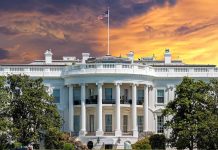
A top Treasury official’s resignation sparks a firestorm as Elon Musk’s allies battle for control of a $6 trillion payment system.
At a Glance
- David Lebryk, top-ranking Treasury official, to resign amid conflict with Musk allies
- Dispute centers on access to sensitive payment system handling $6 trillion annually
- Lebryk’s departure raises concerns due to his extensive experience and nonpartisan approach
- Incident highlights tensions between government oversight and tech innovation
Treasury Turmoil: When Silicon Valley Meets Washington
In a startling development that has sent shockwaves through Washington, David Lebryk, the longest-serving career official in the U.S. Treasury Department, is set to step down from his position. The catalyst for this unexpected departure? A clash with allies of tech mogul Elon Musk over access to a critical payment system that handles a staggering $6 trillion annually.
SCOOP: The highest-ranking Treasury official is expected to depart soon after a clash w/ Elon Musk allies over their demands for access to a sensitive internal government payment system, sources say
Musk allies wanted access to the system responsible for disbursing trillions in…
— Jeff Stein (@JStein_WaPo) January 31, 2025
This system isn’t just any run-of-the-mill financial platform. It’s the backbone of government operations, processing everything from Social Security and Medicare benefits to federal salaries, government contract payments, and tax refunds.
A Career Cut Short: The Cost of Conflict
Lebryk’s impending departure is no small matter. As a veteran of multiple administrations, his nonpartisan approach and steady hand were particularly valuable during the tumultuous days of the Covid-19 pandemic. His ability to navigate complex financial systems while keeping politics at arm’s length was widely respected across party lines.
The timing of this resignation couldn’t be more critical. With the U.S. economy on shaky ground and global financial markets in flux, losing such an experienced hand at the Treasury helm is concerning, to say the least. It’s a stark reminder of how quickly the delicate balance between government oversight and technological innovation can be disrupted when Silicon Valley flexes its muscles in Washington.
The Musk Factor: Innovation or Interference?
Elon Musk’s interest in this payment system remains shrouded in mystery. Is this a genuine attempt to innovate and streamline government operations, or a power play to gain unprecedented access to sensitive financial data? The lack of transparency from both Musk’s camp and the Treasury Department only fuels speculation and concern.
This incident is not occurring in isolation. It’s part of a larger pattern of tech titans wielding their influence in ways that challenge traditional government structures. From cryptocurrency to space exploration, the lines between private enterprise and public interest are increasingly blurred. The question now is whether our regulatory frameworks are equipped to handle this new reality.
The Road Ahead: Balancing Progress and Protection
As we grapple with the fallout from Lebryk’s resignation, it’s clear that a broader conversation is needed. How can we foster innovation in our financial systems without compromising security or democratic oversight? The tension between rapid technological advancement and the necessarily slower pace of government regulation is reaching a breaking point.
This episode serves as a wake-up call. It’s time for a serious dialogue about how to bridge the gap between Silicon Valley’s “move fast and break things” mentality and the government’s responsibility to protect and serve its citizens. The stakes are too high, and the systems too critical, for this clash of cultures to continue unaddressed.






















